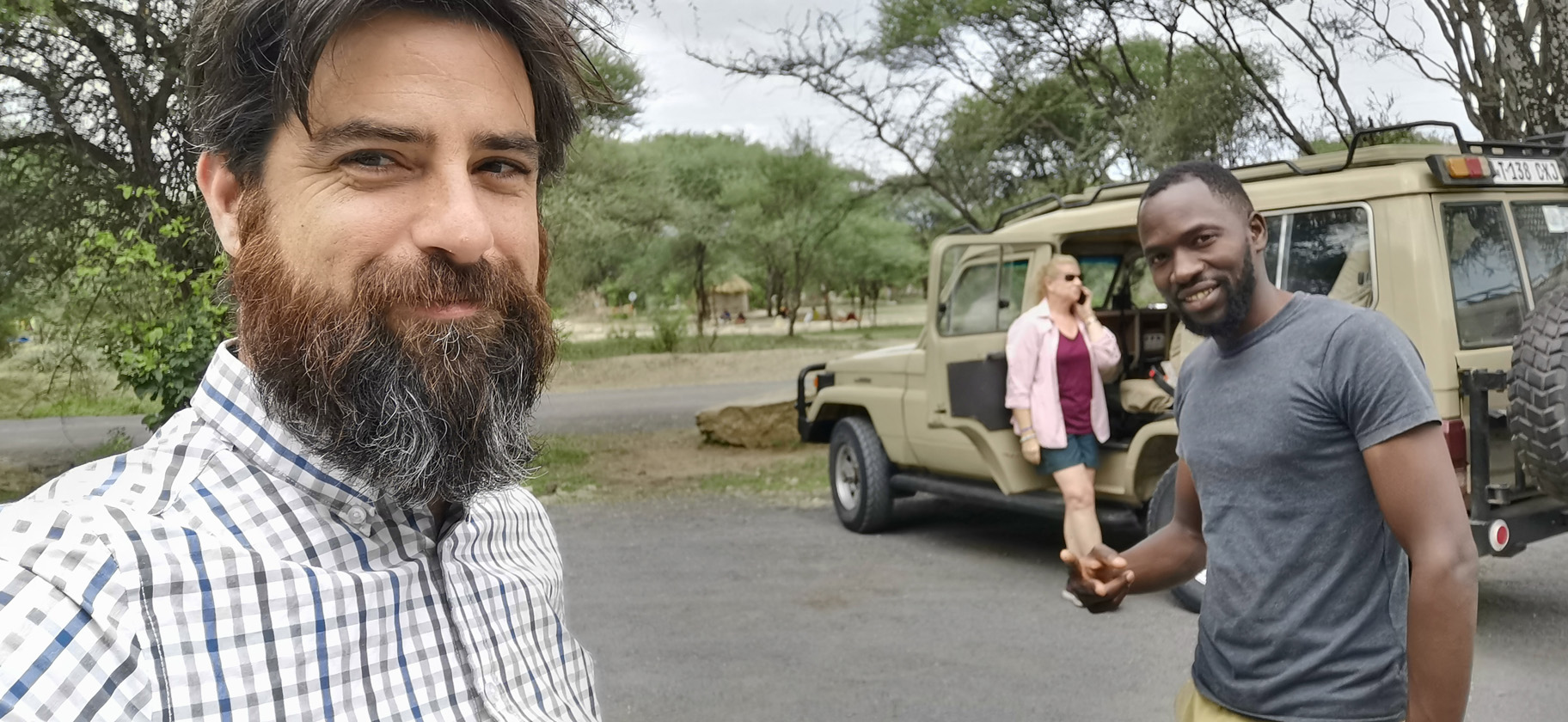The Adventures of the Millenium Falcon
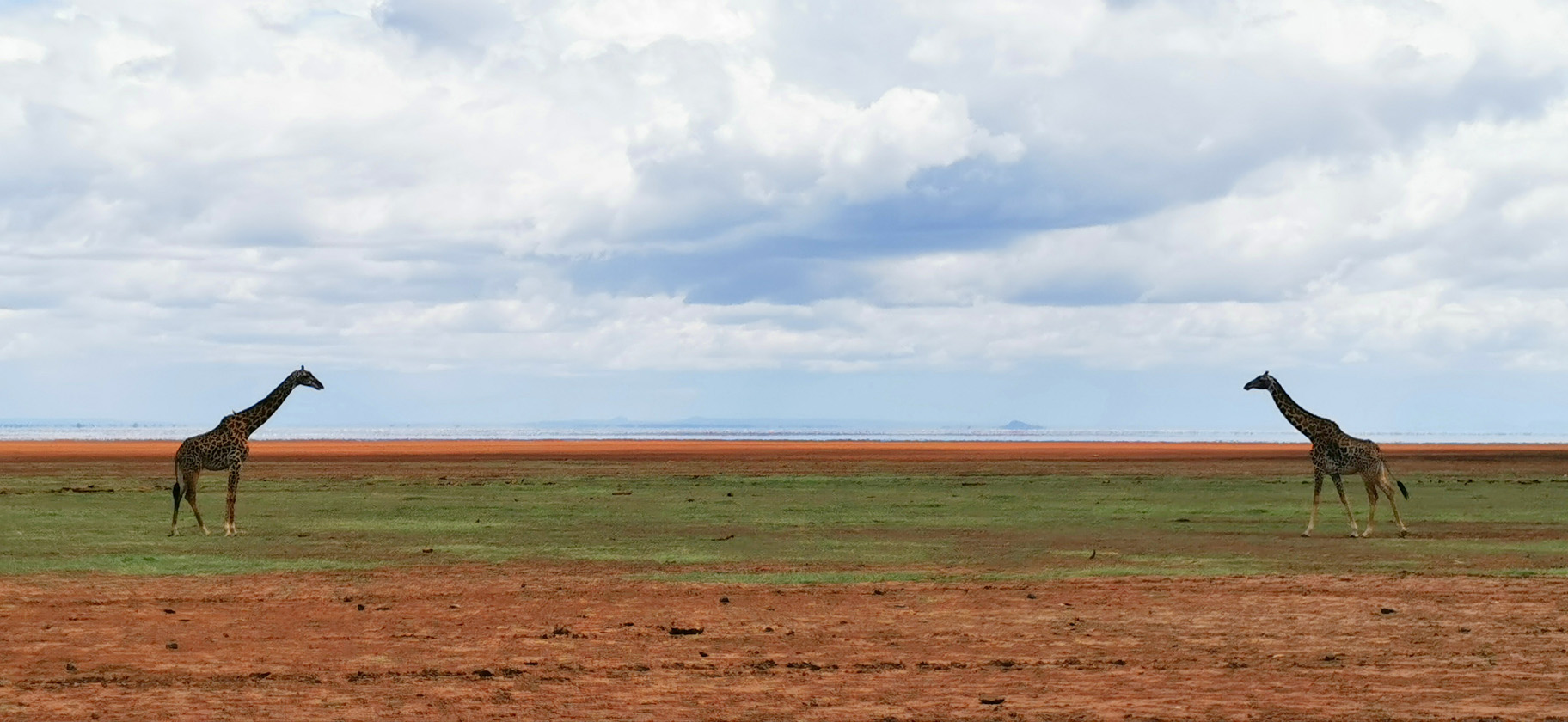
Booking an African safari is a daunting task. Supply far outweighs demand and there is a tremendous lack of transparency. You are quoted a price per day with an itinerary of your choice often with little idea of what you will end up getting. But I had planned for this. The safari was going to be my big adventure in Africa. I had alerted my clients. Work was not going to be an issue.
I awoke in Arusha with one task in mind: book a safari. I couldn’t walk a hundred metres down the street without being approached by someone seeking to convince me to book through them. Some seemed legitimate and some passed me business cards that were handwritten on torn strips of printer paper. I was quoted prices as low as two hundred US dollars per day and as high as 600 US dollars per day for what I was told were both “budget” safaris. Never was I given details about what kind of lodgings I would have, how I would be travelling, or if I would even see any animals. By the end of the day, I had more options than I could count but no idea what to do.
On a tip, I visited a place in Arusha called the Outpost Lodge and explained to the reception that as a solo traveller I was looking to join a safari as a means to keeping my costs low. As I was about to leave I mentioned to the reception that I was not picky about who I went on safari with. “You can even stick me with this lady,” I said pointing over at a woman who was just walking into the lodge and who now had a very confused look on her face. Merrilyn was from Australia where she worked in mining as a sustainability officer, was in her early fifties, and had come up from South Africa where she had been on safari in Kruger National Park and was one day into her safari in Tanzania.
I sat her down and bought her a beer and asked her plainly what she thought about having someone tag along with her on her trip. She showed me a printout of her itinerary and it covered all of the bases including visits to the Serengeti, Ngorogoro Crater and Tarangire. She had five nights left and six days’ worth of game drives still to go. This solved my immediate need of cutting some of my costs down by not having to cover the entire cost of the car and the guide. It was also handy that in a few minutes after our meeting she was meeting with her tour operator who, were I to join her, would be the one selling me the package.
Eliya, the operator, sat down and explained the itinerary. I was fine with it but what I really wanted to know was what I was paying for. This is where Eliya stood apart from the other operators I met with that day. He pulled out a pencil and a piece of paper and began to jot down all of the costs that there were no ways around paying. Things like park fees, certificates, and other monies that had to go to the maintenance of the various parks and the separate fees for actually spending the night in the park. From this, I was able to get a quick sense of why safari is so expensive and understand all of the administrative costs, but this transparency definitely helped to establish trust. While Eliya was explaining the finer details of the itinerary, Merrilyn and I were sizing each other up and wondering if we would be able to get along and tolerate each other for a week. I could have deliberated for days in Arusha trying to save a few bucks here or a few bucks there, but eventually, I decided that this situation felt right and that if she would not mind having me along that I would be up for it. “Just shut the fuck up when animals are around,” she said, “or else I’ll feed you to the lions”.
Eliya picked me up the next morning from where I was staying before the sun was even up. He had brought his card reader with him and ran the transaction through and we were off.
We were leaving the city behind and heading into the bush so the landcruiser needed packing. It was an old bucket of bolts. It had a small refrigerator that did not work, various plugs and outlets that worked intermittently, and other various add-ons that appeared as if they were just for show. In town, we needed to get water to last us for six days and right away the touts and hawkers were on me trying to sell me sun hats, wooden spoons, beach towels, and anything they could find – none of the locals said a word to Merrilyn. This was also where I met our guide, Moses, for the first time. I was excited to be on safari and shaking his hand with a big smile on my face I said, “how are you doing, buddy?”
“Not so good,” he responded pointing to his tummy.
It was not a good way to start the day. I gave him a concerned looked but he reassured me that everything would be just fine.
At the entrance to the park, I was immediately dazzled by the sight of some baboons and a few impalas. We had gotten off to a lucky start, I thought. Merrilyn was rather blasé about it all and sharing her disdain for baboons and monkeys. Previously on safari, a troupe of monkeys had ransacked her room and shit everywhere including on all of her clothes. Along a narrow track through a tropical forest, one by one a few animals would emerge or could be seen in various clearings a bit off the track. Suddenly the forest gave way to an open grassland that was filled with all manner of African animals as far as the eye could see. There were zebra, buffalo, warthogs, flamingoes, wildebeest, and giraffes. It felt like every corner of the lake was full of animals. For the uninitiated such as myself, it was a clear case of shock and awe. When people daydream about an untouched wilderness teeming with wildlife, this is what they see. I had heard about it, read articles about it, and seen it on TV, but it was not until I was seeing it with my own eyes, in the flesh, that it became truly real. I know that there were no other sounds but the Earth and the occasional grunt from the motors of various landcruisers as they ambled along the muddy tracks, but the memory that burrowed its way into my brain includes a choir chanting hymns to the sun, the rain, and the wave of moisture that blurred every colour in the distance.

Safari has an unfortunate direct link to various tourism networks in the area. On the fringes of the parks are various cultural shops that sell paintings, bead necklaces, and other local crafts tailored to tourists’ tastes and that visitors mistake for being authentically African. Still, the guides are obliged to take you there and we were brought to a market specializing in tanzanite – a purple-hued precious stone native to Tanzania. Merrilyn was a big fan of tanzanite so this stop suited her. I was interested only in game driving so I meandered through the arts and crafts while we waited for Moses to pick us up. Merrilyn spent the whole visit by the tanzanite display case and when I grew tired of the market having seen what I had come to see I went over to where she was browsing and asked if she had found anything she liked. She had been ignored by the shop clerks for the better part of twenty minutes but, when I arrived, suddenly a half dozen store clerks turned around and began pulling items out of the display cases for her to inspect. Merrilyn could afford her own tanzanite necklace but the perception is that it is the men who have the money.
“Guys, I’m not feeling well,” Moses complained when he picked us up. “I’m going to drop you at the lodge and then I think I will have to go to the doctor.”
Moments before dinner, Moses came into the lodge to greet us and he introduced us to his friend Luttiba who would be taking over for him for the rest of the safari. Moses had contracted typhoid from the local drinking water and, as someone who has suffered from typhoid, I sympathized. Moses had sympathetic eyes and there was something in the way that he carried himself that instilled a sense of trust. He had developed a dad bod and came across as too meek and too kind to possibly try and take advantage of you. Luttiba, on the other hand, was wirey and had a big smile and a lot of charm. He always had a toothpick in his mouth and he often wore sunglasses which meant you couldn’t see into his eyes. He was fascinated with my beard and laughed a lot and gave high fives. We were out of Arusha now and in the bush and there was something that did not sit well with the situation. I sent a message to Eliya to explain what was going on and asked what we should do, but I never heard back.
We set off bright and early the next morning on what would be our longest trip through Ngorogoro all the way to Serengeti. We had just come around the lip on the far side of the crater when suddenly the car stopped and Luttiba said, “uh oh!”
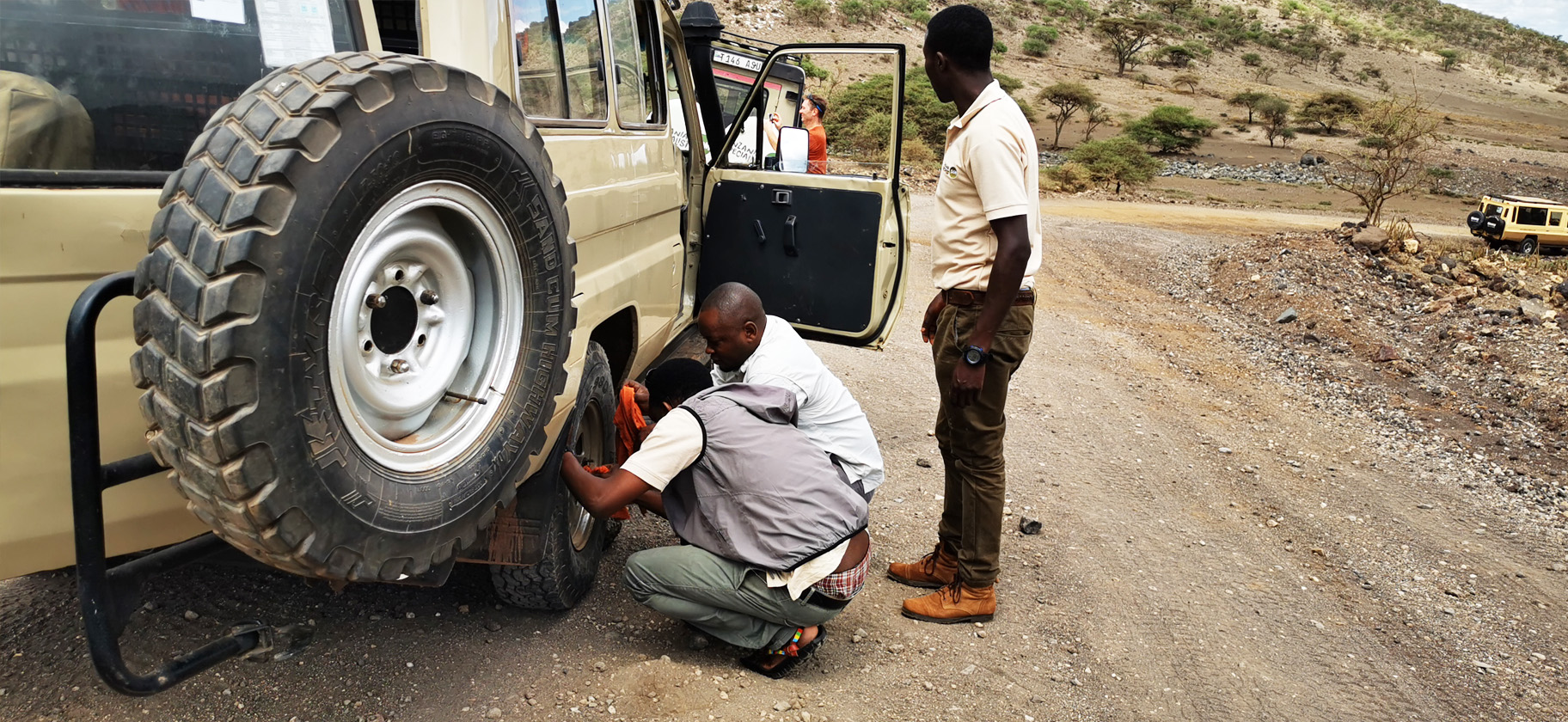 I was clueless as to what was going on but Luttiba and Merrilyn were discussing the possibilities of what the problem might be. I knew nothing about four-by-fours and four-wheel-drive mechanics but they kept mentioning a problem with “the diff”. What it meant was that the car could go in reverse, but it would not go forward. Several landcruisers passed us going in either direction and a few stopped to help out. Meanwhile, Maasai women began to emerge out of the sparsely wooded area looking to sell us beads and local honey. They wore long robes and had shaved heads and drooping ears from the large hoops they wore to stretch their lobes. They asked Merrilyn and me how many children we each had and we mentioned that neither of us had any. Not able to fully fathom that for us to have or not have children was a choice, all of the women laughed at us as though we were defective. They were all in their mid-twenties and already had four or five children each. Meanwhile, Luttiba and a few other guides were trying to figure out what was wrong with our landcruiser and Merrilyn and I began to wonder if this was going to be the kind of situation they can solve in just a few minutes, or would it take all day.
I was clueless as to what was going on but Luttiba and Merrilyn were discussing the possibilities of what the problem might be. I knew nothing about four-by-fours and four-wheel-drive mechanics but they kept mentioning a problem with “the diff”. What it meant was that the car could go in reverse, but it would not go forward. Several landcruisers passed us going in either direction and a few stopped to help out. Meanwhile, Maasai women began to emerge out of the sparsely wooded area looking to sell us beads and local honey. They wore long robes and had shaved heads and drooping ears from the large hoops they wore to stretch their lobes. They asked Merrilyn and me how many children we each had and we mentioned that neither of us had any. Not able to fully fathom that for us to have or not have children was a choice, all of the women laughed at us as though we were defective. They were all in their mid-twenties and already had four or five children each. Meanwhile, Luttiba and a few other guides were trying to figure out what was wrong with our landcruiser and Merrilyn and I began to wonder if this was going to be the kind of situation they can solve in just a few minutes, or would it take all day.
After a while, we were told to gather our belongings and were guided over to another truck where we joined a young German couple, Dimitri and Nadia, who were on their honeymoon. When they booked their safari they had expected to be joining a larger group and it ended up just being the two of them so they were happy to see other people. But for Merrilyn who had expected a private tour, her entourage had now swelled to four people in a now slightly crowded land cruiser. I had only been on safari for a day and a half and was already on my third guide, Rashid.
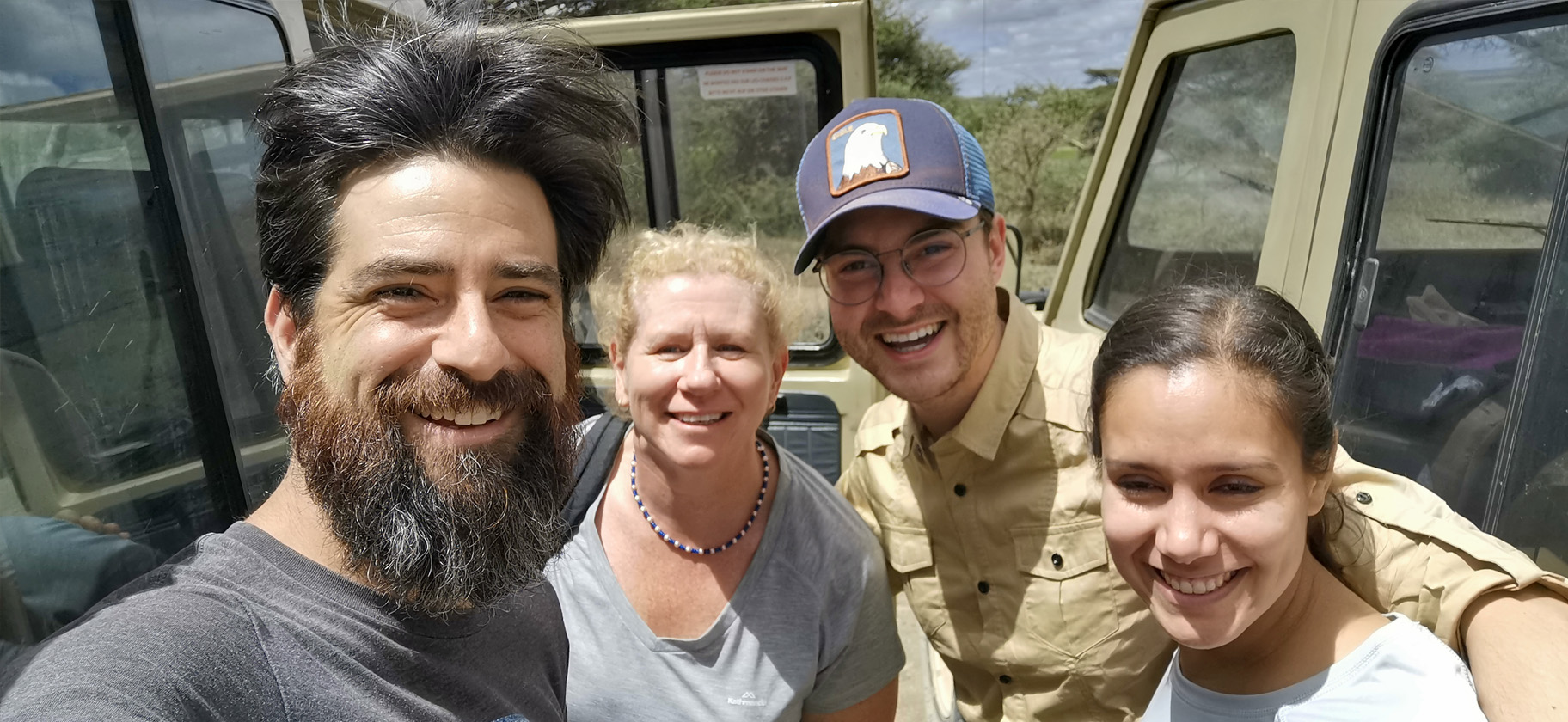 Having more people around was fine and everyone got along. The problems only started after we ate lunch at the entrance gate to the Serengeti park. Our certificates of admittance, one of those administrative costs that Eliya had broken down for me, had never been passed to Rashid which meant that we were barred from entering the park with him until the certificates showed up. To make matters more difficult, being so far from any major city centre, our local pre-paid SIM cards no longer had coverage meaning we could not contact Eliya who was the one most able to solve our current predicament. It dawned on us that we had no other contact information for our trip and no way to reach Luttiba and Moses might have had our certificates and never passed them to Luttiba if there were ever any certificates to begin with. We could not even give Rashid Luttiba’s contact information to get an update on the status of the land cruiser because he had only been with us a few hours and we had never shared our contact information. Merrilyn had Moses’ number, but no signal, and he was presumably sick and in bed. We had Eliya’s contact information and passed it to Rashid hoping that they could speak and sort things out. We only ever got Rashid’s side of whatever they talked about and he just kept huffing and shaking his head and hanging up and telling us in his broken English that our tour operator was crazy and being difficult. Merrilyn and I then took a moment in the shade to discuss what might be going on.
Having more people around was fine and everyone got along. The problems only started after we ate lunch at the entrance gate to the Serengeti park. Our certificates of admittance, one of those administrative costs that Eliya had broken down for me, had never been passed to Rashid which meant that we were barred from entering the park with him until the certificates showed up. To make matters more difficult, being so far from any major city centre, our local pre-paid SIM cards no longer had coverage meaning we could not contact Eliya who was the one most able to solve our current predicament. It dawned on us that we had no other contact information for our trip and no way to reach Luttiba and Moses might have had our certificates and never passed them to Luttiba if there were ever any certificates to begin with. We could not even give Rashid Luttiba’s contact information to get an update on the status of the land cruiser because he had only been with us a few hours and we had never shared our contact information. Merrilyn had Moses’ number, but no signal, and he was presumably sick and in bed. We had Eliya’s contact information and passed it to Rashid hoping that they could speak and sort things out. We only ever got Rashid’s side of whatever they talked about and he just kept huffing and shaking his head and hanging up and telling us in his broken English that our tour operator was crazy and being difficult. Merrilyn and I then took a moment in the shade to discuss what might be going on.
“They’re not going to let us in without those certificates,” Merrilyn said, “but we can’t ask Rashid to hold up Nadia and Dimitri just to wait for us. That’s not fair, that’s not what they paid for.”
“Do you think maybe there’s a chance we’re victims here of a scam?” I asked her.
“I’d never thought of that,” she said.
We looked at each other like it was impossible that we had been conned.
“I think this is just a lot of bad luck,” I said. “It’s gotta be, right?”
“I agree, it’s way too elaborate for it to be a scam.”
The moment was approaching when decisions needed to be made. As things stood, we could not accompany Dimitri and Nadia anymore and it was looking like we were going to be left there at the gate without a guide and without any way to contact Luttiba or Eliya. Merrilyn spoke up and said, “You know what solves all kinds of problems, Ian? Money.”
I had just spent a couple of thousand dollars and there I was contemplating spending the same sum again, and maybe more, to pretend like it never happened and get on with the experience.
“So that’s what we’re going to do?” I asked Merrilyn, “We’re going to just pay Rashid to join Dimitri and Nadia?”
“What else can we do? Well, I mean, I think that’s what I’m going to do. You have to do what’s right for you.”
Merrilyn and I were on day 2 of our adventure together and aside from having dinner and a couple of beers and a day of game driving together, we barely knew each other. Going our separate ways right then would have been no harm and no foul. Paying a second time for a safari cut into my stomach like a jagged shard of broken glass. I believe that I work hard for the money I earn so I don’t like seeing a single cent of it wasted whether it be the dime lost by dropping a piece of gum on the filthy ground or several thousands of dollars, countless hours, days and weeks, of my time, flushed down the toilet by circumstances out of my control. Or worse, someone trying to take me. A million scenarios were racing through my mind all at the same time when suddenly we heard someone wailing from over the ridge: “Hey guys!”
Luttiba came bounding down the path in his flip-flops that were made from an old car tire through the picnic area to the park’s office unaware of anything that had happened to us since we reached Serengeti. He was a sweet sight. He had a big smile on his face and you would have thought nothing untoward had happened. Thankfully, he had our certificates and when we finally got back on the track he told us about not wanting us to have to wait there and watch him futz about underneath the landcruiser for an hour. But, like a good bush mechanic, he plugged a few holes and got the car running so she could go forward though we would no longer be able to rely on its four-wheel-drive capabilities. We were ostensibly travelling on the rough and rugged terrain of a safari for the next 5 days behind the wheel of a sedan.
Because of our setbacks, our game drive in Serengeti started late but within a few minutes, we had seen lions, leopards, and cheetahs. We had been in the park for no more than an hour and it made me think that spotting animals was no real bother and that they were everywhere, but I would not see another cheetah for the rest of my time in Africa, and only one more leopard. Starting the game drive late meant that we also arrived at our camp after dark. Travelling through Serengeti at sunset is special. The effect that the light has on the terrain is sublime and when the horizons are populated with wild animals it makes for a surreal experience that even awe-inducing photos do not do justice.
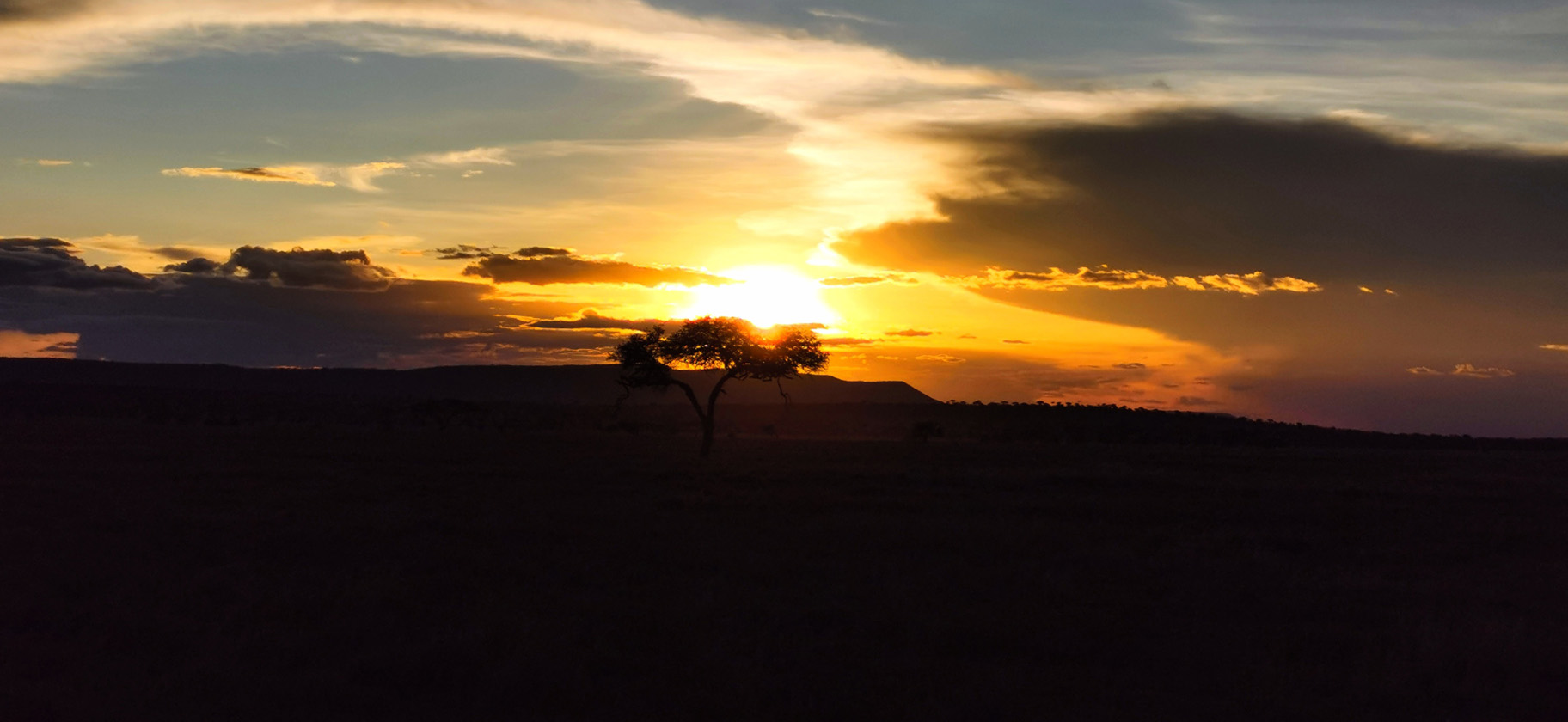
Kati Kati Camp was situated in the heart of the Serengeti and how they manage to make it so comfortable is impressive. There was a large double bed inside a tent that was larger than my apartment in Vancouver. It had a sink with running water, a flush toilet and a shower that ran on bags of warm water that they supplied for you if you asked. The water would drizzle down for about 10 minutes before it ran out and it helped to give that rustic wilderness feeling while still providing a high level of comfort. A warm shower after a long dusty drive through the Serengeti is as pleasant an experience as it sounds. Unlike the lodge outside of Lake of Manyara, Kati Kati Camp was part of the park, in the heart of the bush, and very wild. It was not uncommon for animals, herbivores and carnivores, to pass through the camp and for safety you needed to flash for a guide to escort you to the dining tent for supper and back.
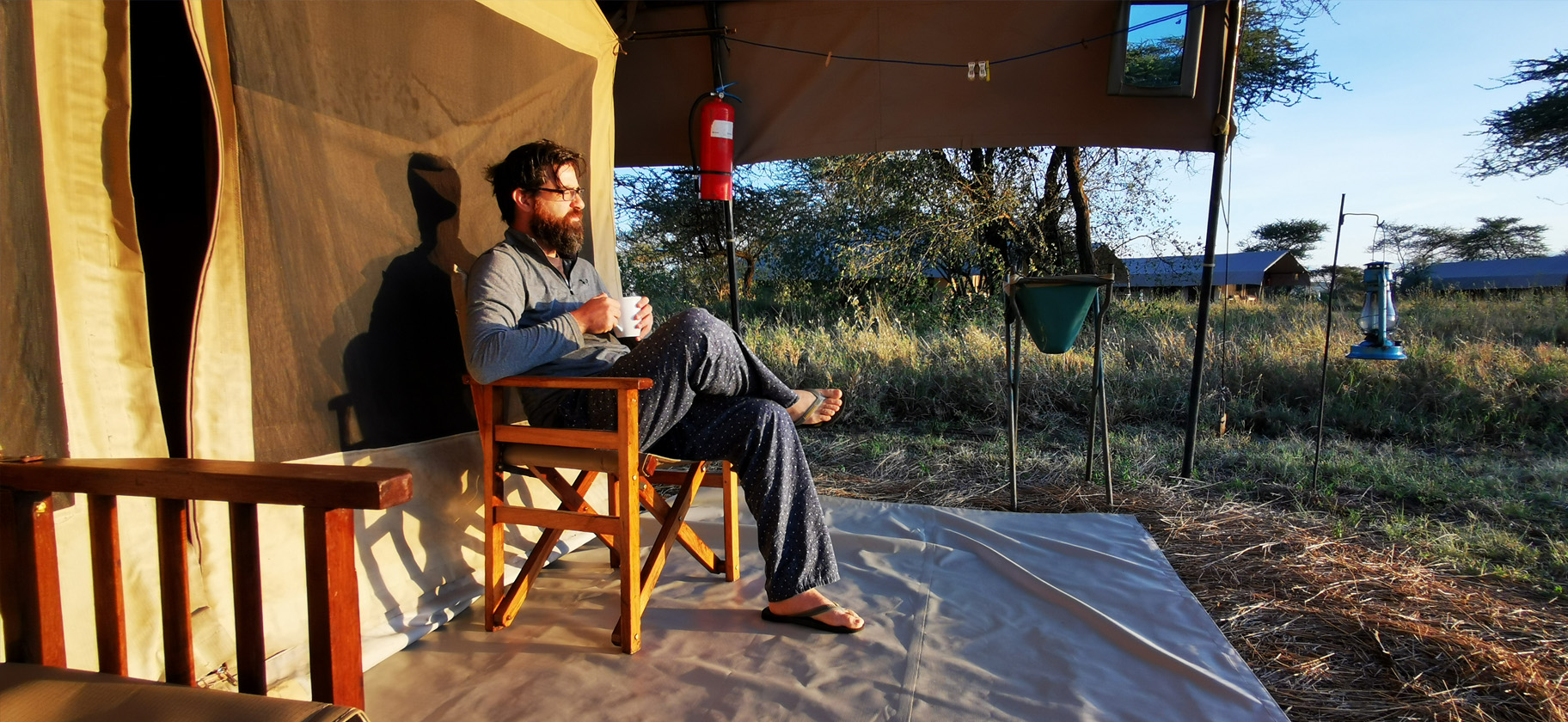 We were set to be starting out early the next morning for a full game drive in Serengeti with a second night at Kati Kati Camp at the end. I was up a few minutes before sunrise and flashed for a guide to get me to the kitchen tent so that I could grab a cup of coffee. There was a small camp chair in front of each tent and I sat and drank my morning brew and watched the sunrise. A few impalas crept gingerly across my line of sight through the camp and that moment of serenity seemed the perfect antidote to the chaos of the previous day. You could have ended the safari after that moment with all the rest of my money wasted and I would not have cared. Everything was fine. I had changed.
We were set to be starting out early the next morning for a full game drive in Serengeti with a second night at Kati Kati Camp at the end. I was up a few minutes before sunrise and flashed for a guide to get me to the kitchen tent so that I could grab a cup of coffee. There was a small camp chair in front of each tent and I sat and drank my morning brew and watched the sunrise. A few impalas crept gingerly across my line of sight through the camp and that moment of serenity seemed the perfect antidote to the chaos of the previous day. You could have ended the safari after that moment with all the rest of my money wasted and I would not have cared. Everything was fine. I had changed.
Sunset in the Serengeti, seeing cheetahs and leopards and lions, and having that blissful moment at sunup are the memories you want when you sign up, but they have the effect of almost being too perfect and robbing you of the joy and wonderment of other great moments you experience during the drives. That second drive through Serengeti was equally wonderful and we continued to create incredible moments with elephants, hippos, zebras, wildebeests, dik-diks, buffaloes, warthogs, hyenas, ostriches, eagles, secretary birds, kori bustards, and more. But, in some way, I felt like I had already climbed to the top of the mountain. The experience is all about seeing animals and every moment in the landcruiser speeding along the tracks that wend through the open plain was a once in a lifetime experience, but with less focus being put on chasing down wildlife and seeking to capture that perfect picture, it gave me a chance to get to know the people I was sharing the jeep with. We were sharing this experience and instead of, at the end of each day, going our separate ways, we made a point to always gather together and have a drink and eat dinner. Merrilyn and Luttiba were becoming friends.
When we left Serengeti and headed back through Ngorogoro crater and through the “icebox” the scenes changed from dusty open plains to misty green grassland. Clouds get trapped in the crater blocking the sun and muting all of the colours. The setting had changed but the animals felt the same. There were hopes of seeing more cheetahs and from a great distance we did manage to catch a glimpse of a rhino, but lions and elephants were the more common awe-inducing sights.
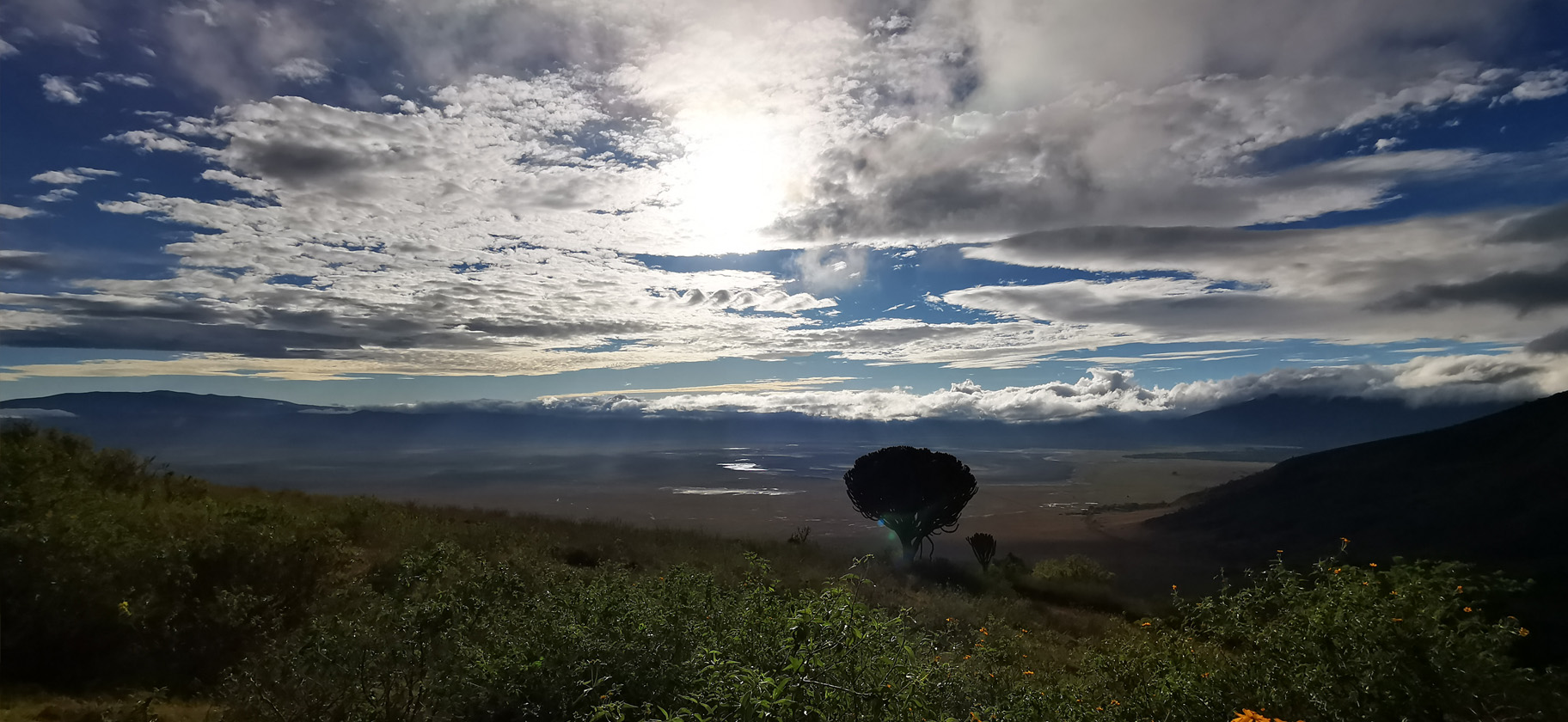
As the days went on, Luttiba’s character also began to grow. He was 30 and from Oldonyo Lengai, a small village at the base of a volcanic crater on the eastern fringe of the Serengeti. He was Maasai and liked being a guide, but hoped to have his own tour operation someday. The three of us brainstormed for hours during our drives about ways to enhance a safari with cultural experiences so that his tours could offer something that other tours did not. Game tours are an experience that changes anyone who participates in one, but they are generally focused on just the animals and game drives. All you are really doing is sitting (or standing) in a land cruiser all day and watching and photographing animals. It does not sound like all that much, but it can be exhausting and you inevitably reach the end of each day looking forward to an energy replenishing meal and a good sleep. The drives, however, are even more exhausting for the guides who have to maneuver over the various dirt tracks which, even with four-wheel-drive, can prove to be fairly tricky terrain but here was Luttiba maneuvering our old bucket of bolts with the drive on only two wheels working. In a single day, they can cover four to six hundred kilometres, and none of that distance is covered on a smooth tarmac road travelling 100 kilometres per hour, it is all white knuckle driving over rocks and dirt. The ways that they try to break up the day and get a break leave something to be desired and is a segment of the industry that is rife with opportunities for improvement.
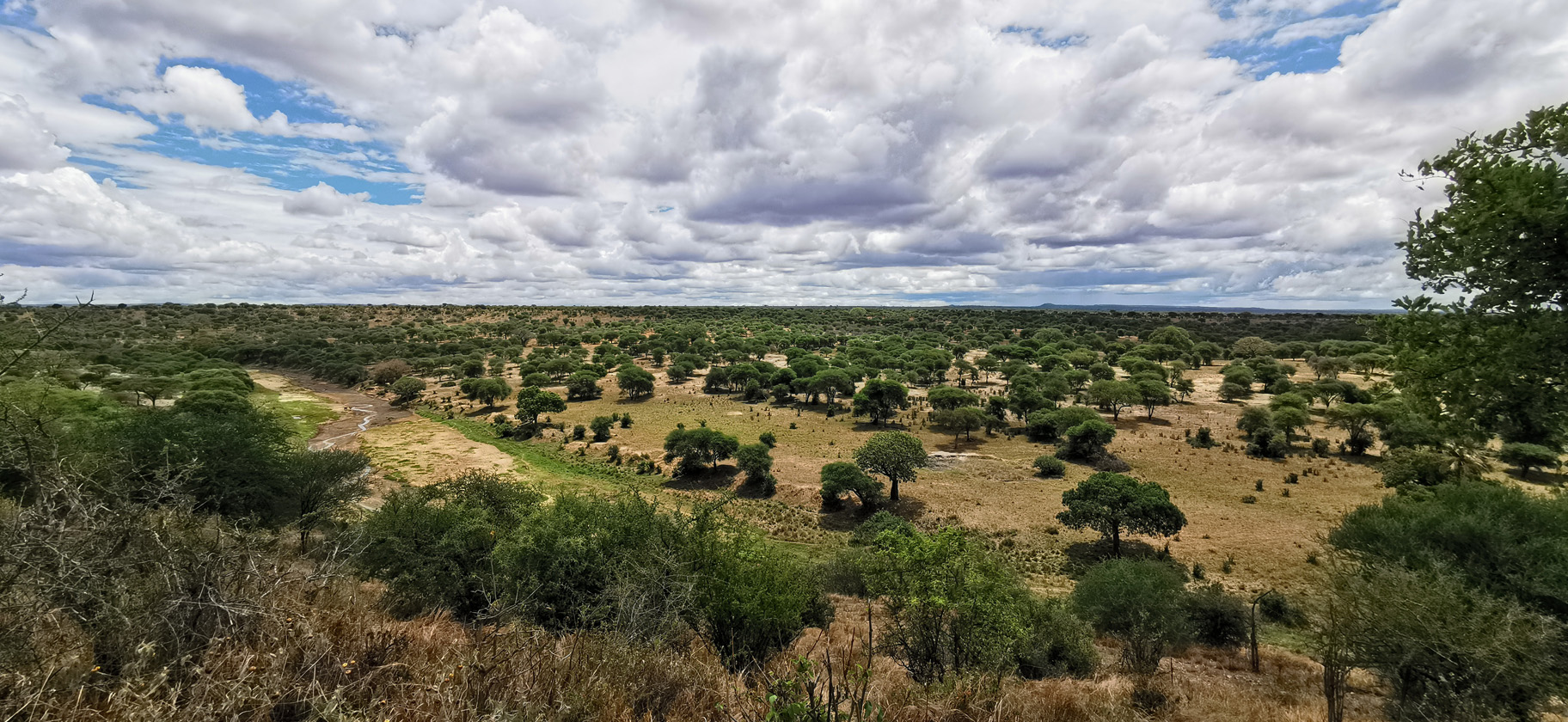 Our last day together was spent in Tarangire. The scenery changed again but the animals stayed the same. Of all of the parks we visited, Tarangire most resembles the habitat that your local zoo would have tried to recreate to make you believe you were in Africa. It had gentle sloping hills, some sparse grasslands, thick baobab trees, and some dense woodlands. We were all tired but had become good chums by now. There had been enough laughs between Merrilyn and me at this point that were we to again be presented with the crossroads we faced days earlier at the gates of the Serengeti, parting ways might not have been a viable option. I not only managed to avoid being fed to the lions but when you share such an intense and emotional experience like a safari, it forces you closer to the people you share it with and by now we were in this together.
Our last day together was spent in Tarangire. The scenery changed again but the animals stayed the same. Of all of the parks we visited, Tarangire most resembles the habitat that your local zoo would have tried to recreate to make you believe you were in Africa. It had gentle sloping hills, some sparse grasslands, thick baobab trees, and some dense woodlands. We were all tired but had become good chums by now. There had been enough laughs between Merrilyn and me at this point that were we to again be presented with the crossroads we faced days earlier at the gates of the Serengeti, parting ways might not have been a viable option. I not only managed to avoid being fed to the lions but when you share such an intense and emotional experience like a safari, it forces you closer to the people you share it with and by now we were in this together.
Merrilyn was set to be flying home in a couple of days and I had to think about moving on to my own next destination. The carrier that would be responsible for Merrilyn’s flight went on strike the morning of that last day in the bush and it meant that her flight got cancelled and she spent a good part of the morning on the phone, paying a fortune in international roaming charges, with customer support needing to make new travel arrangements. In the meantime, Luttiba and I talked, and somehow it came up that he had never seen Star Wars. Even in this day and age where we are all connected all of the time, a multi-billion-dollar global franchise like Star Wars somehow managed to evade Luttiba’s attention. This was Africa. Outside the gates of Tarangire, I connected to the 4G network and showed him the old trailer from 1977. I also showed him the trailer for the upcoming Rise of Skywalker. He stared into my phone with intense curiosity.
As a child of the eighties, Star Wars has always held a special place in my heart and I told Luttiba that he should make an effort to check it out. I tried my best to explain the Millenium Falcon to him and told him about this spacecraft that every character looks at and describes as a piece of junk, but that those on board invariably become attached to because of the adventures that they share on board. “You’ve never heard of the Millenium Falcon?” I asked Luttiba.
Somewhat stunned he just shook his shoulders and said, “Should I have?”
To which I replied: “It’s the ship that made the Kessel run in less than 12 parsecs.” Poor Luttiba had no idea what I was talking about.
I showed him a picture of Lando Calrissian and explained that he had been one of the pilots of the Millenium Falcon. “You remind me of him a bit,” I told Luttiba. “He’s charming and a bit of a scoundrel”. The entire trip Merrilyn had been referring to herself as “the Queen” and then I showed and explained to Luttiba who Princess Leia was. And finally, I introduced Luttiba to Chewbacca and explained that with all of the fur on my face I was a bit like him. Luttiba laughed.
We had cruised around on safari in a world that seemed like a galaxy far, far away from anything familiar. We shared a once-in-a-lifetime experience and made amazing memories in an old hunk of junk that was barely roadworthy which made the adventure seem all the more satisfying.
We all still keep in touch.
